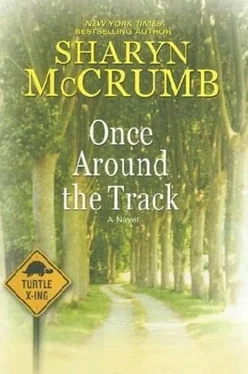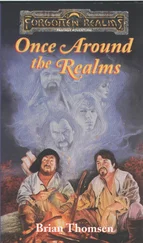Not that her mother had anything against sports. Rosalind had been taught to ride a Shetland pony before she could walk, and she had the requisite number of tarnished silver cups stashed in a closet somewhere, attesting to a youth spent competing in local horse shows. The family had several friends who were followers of Formula One racing, which was considered quite respectable, even in the best circles, probably because there was a large European contingent to the sport, or because the cars bore no resemblance to anything one might actually drive. Upper-class pursuits had to be archaic or frivolous to be acceptable; practicality was for the proletariat.
And American stock car racing? Her mother equated it with competitive bowling or even professional wrestling. She thought it wasn’t a sport, and that the cars looked too much like personal vehicles to be interesting. Surely anybody could drive one? Rosalind, who knew quite a bit about the sport, could have set her mother straight on that. She had the little speech down pat for when the subject came up in conversation with acquaintances.
“Oh, so you think stock car racing isn’t a sport, do you? You think that because you can drive a Chevrolet it’s easy, huh? Fine. Let’s see you get in your car and drive for five hundred miles without getting out, and the longest you can stop is thirteen seconds. You have to watch beside and behind you all the time, because forty-two other cars are coming at you at a speed of three miles per minute. And the temperature in your car is over a hundred degrees. The g-forces pull your body to the right while you are trying to turn the wheel to the left to make the turns; if you’re not strong enough to maintain control, you go into the wall at one hundred eighty miles per hour, and if you are strong enough not to wreck, your body will feel like you spent three hours tumbling in a clothes dryer. At the end of every race the heels of both your hands will be solid blisters from fighting the wheel, and you may have burns on your feet as well if your suit doesn’t protect you enough. You need the hand-eye coordination of a bomb technician, the depth perception of a sniper, the courage of a smoke jumper, and the strength and stamina of a rock climber. Oh, yeah, it’s a sport.”
She seldom got to deliver this speech in its entirety before her listeners’ eyes glazed over, but she enjoyed the self-righteous glow it gave her to defend the downtrodden. She had never attempted to enlighten her mother with this lecture, however. Listening was not Mother’s forte. She would let you rattle on until you ran out of steam, and then she would favor you with that superior little smile of hers and solemnly agree with everything you had said, in tones suggesting that you lined your hat with tin foil.
You couldn’t tell Mother anything she didn’t already know.
“Really, Rosalind,” she would have said. “You might as well go off and join the circus.”
Well, thought Rosalind, so she had. Joined the circus. Exactly. NASCAR: Brightly colored haulers assemble each week in an arena in a different town, a different state. Then on Saturday night or Sunday afternoon the “greatest show on earth” is performed for a cheering crowd of thousands, and when it is over, the workers break it all down and move it to another place to begin all over again the next week. The circus, indeed. Rosalind would like to have seen her mother try to explain that to the ladies in her club.
As satisfying as it was to horrify Mrs. Manning with her career decision, Rosalind wasn’t joining a NASCAR team only to spite her mother. That was just the icing on the cake. Thanks to her father, she really was interested in the mechanics of the sport. From the time she could walk, “Daddy’s girl” had preferred wrenches and pliers to dolls. Daddy had always been tinkering with some machine in his spare time-a remote-controlled airplane, the motor of his sports car, even a broken kitchen appliance. If it had gears or moving parts, it was fair game for Clifton Manning. Early on Rosalind had learned that the way to Daddy’s heart was via a stream of alternating current.
How cute she had been in a little pink overall, with a socket wrench in each chubby fist, and an axle grease moustache. When she was in fourth grade, Rosalind’s father had died of a stroke, and she had burrowed into her grief for a while by sitting out in Daddy’s workshop, straightening the tools, and keeping the place swept, as if by doing so she could entice him into coming back.
By the time she recovered from her loss, Rosalind was as hooked on machinery as her father had been, or perhaps her interest was the result of a genetic legacy from him. She had stuck with her obsession through years of ballet classes, pony club meets, dancing lessons, and four years in an all-girls boarding school, where “shop” meant “Bloomingdale’s” and “auto mechanics” was not an option in the curriculum. Despite her mother’s best efforts at molding her into a young lady of culture and refinement, Rosalind’s interests were unwavering. She used her allowance to subscribe to Road and Track.
It wasn’t just her “unladylike” interest in machines that had caused the rift between parent and child. Rosalind felt that her entire existence was an affront to her mother’s expectations. In perfect conformity to the corporeal dress code of her social circle, Mrs. Manning was a slender and elegant swan. Rosalind herself was more of a pouter pigeon: dumpy and neckless, with stubby legs and a matronly shape that resisted every program of diet and exercise her mother had imposed upon her in an effort to battle the inevitable. Even her mother’s indomitable will had not been able to conquer heredity: Rosalind got her looks from her father’s side of the family, but also her brains.
Her mother might not have minded so much about her intellectual pursuits if she had been able to look the part of her debutante. In a graceful and beautiful young woman, such an unlikely pastime as auto mechanics might even have passed for an amusing eccentricity. But dumpy little Rosalind was too earnest and awkward for anything she did to be fashionable. She didn’t know what was worse: her mother’s constant belittling efforts to change her throughout her adolescence, or the feeling of reproach and failure that she got when those maternal efforts finally ceased. She was not the daughter her mother had wanted. She hoped she might be the child her father would have approved of, but she would never know. She could only please herself and be satisfied with that.
When it came time for college, Rosalind had resisted her mother’s halfhearted efforts to send her to a genteel finishing school. She had the grades and the aptitude for engineering and a trust fund to finance her independence, so off she went to MIT, where presumably ugly ducklings would be recognized as swans.
Okay, maybe even MIT didn’t recognize her as a swan, but they did confirm her assumption that she was a damned smart duck. She aced her automotive engineering classes, and she seemed to understand motors in the same instinctive way that her Virginia forebears once understood their thoroughbred horses. Her mother had not been able to make it to graduation, because she had been on an antiques-buying tour in southern France that month, but she had sent Rosalind flowers, a card, and a graduation present: a gift certificate for a spa and diet ranch in Arizona. Rosalind sent a careful thank-you note to her mother, a somewhat more sincere letter to the administrator of her trust fund, and she resolved never to go home again.
She had moved to Mooresville shortly after graduation on the advice of some of her fellow students, North Carolinians who assured her that if she wanted a job with race cars, Mooresville was the place to go. She liked the town well enough, once she got over the urge to reach for an English/Mooresville dictionary every time she had to talk to somebody. It was easy enough to find people to talk to about things mechanical, which was about all Rosalind could talk about without self-consciousness, but she found that the employment prospects were another matter altogether. Despite her stellar qualifications-a stratospheric GPA from MIT-she found that race teams were not eager to employ an overeducated young woman as a member of the crew. In many ways stock car racing was still an old boys’ network and a family business, where second-and third-generation family members worked in a sport they had been raised in. Rosalind found it difficult even to get people to talk to her, much less consider hiring her. A rich girl from Michigan with a fancy college degree was nobody’s idea of a chief engineer.
Читать дальше












